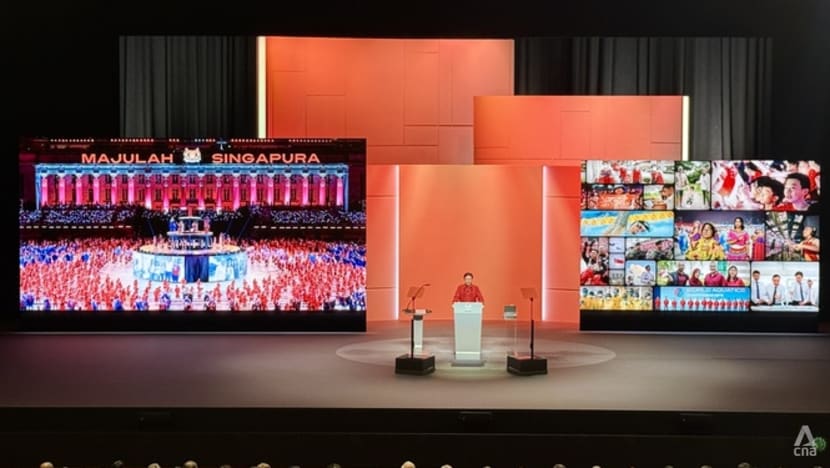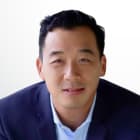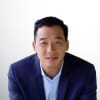Commentary: PM Lawrence Wong’s NDR speech focused largely on practical policy issues for a reason
Prime Minister Lawrence Wong’s National Day Rally speech was likely aimed at sending a clear message that he and his government remain focused on addressing the key challenges facing the country, says former NMP Nicholas Fang.

Singapore's Prime Minister Lawrence Wong speaks during the National Day Rally on Aug 17, 2025. (Photo: CNA/Jeremy Long)

This audio is generated by an AI tool.
SINGAPORE: In a year when Singapore marked its 60th birthday and the incumbent People’s Action Party secured a decisive win at the polls, many had expected this year’s National Day Rally (NDR) – depending on who you asked – to be uplifting, inspirational or even come with a touch of razzle-dazzle.
I for one was curious to see what approach Prime Minister Lawrence Wong would take. This was his second NDR as leader, and the first since securing an improved mandate in the May general election - bucking the historical trend of the ruling party’s vote share declining after a new prime minister takes office.
Would he seek to add more texture to the vision of his 4G team for Singapore in the next 60 years, lay out a road map for how Singapore can remain “exceptional”, address the multiple challenges facing the country in an increasingly complex and contested global environment, or would he continue the SG60 celebratory rhetoric?
A FOCUS ON PRACTICAL POLICY
As it turns out, Mr Wong devoted most of his speech to addressing practical policy issues that are likely on the minds of many Singaporeans.
These included the government’s efforts to review the economy amid global headwinds, its prioritisation of technology and innovation as a way to create jobs for Singaporeans while remaining competitive and attractive to talent and investment, and how to tap on emerging technologies like quantum computing and artificial intelligence while protecting the youth from the negative effects of overuse and over-reliance on such tech.
He also spoke about social challenges such as vaping, and Singapore’s journey to becoming a super-aged society in the years ahead.
About two-thirds of his one-and-a-half-hour speech in English focused on these policy areas, with the rest spent on broader ideas tied to his vision of a “Singapore Spirit”.
Perhaps this should not be surprising, given what emerged during GE2025. Many observers noted that Singaporeans had displayed greater pragmatism and a more practical approach when casting their votes, evaluating candidates more on what they had or could do on the ground, rather than lofty ideals or political rhetoric.
“That is how my team and I intend to lead. Not just doing things for Singaporeans – but doing things with Singaporeans,” Mr Wong said in his speech.
With this in mind, Mr Wong could have been seeking to send a clear message to these citizens that he and his government remain focused on addressing the key challenges facing the country, while potentially avoiding any over-reliance on the SG60 narrative.
At the same time, some observers have noted that, if these are the most pressing issues that the Singapore Prime Minister had to address in his most seminal speech of the year, then perhaps Singapore deserves its reputation as a comparatively stable, secure and well-run nation amid the current global uncertainty.
A “WE FIRST” SOCIETY
But Mr Wong did devote time in his speech to laying out his vision for what he called the “Singapore Spirit”, with an emphasis on building a “we first” society.
He described this as one in which Singaporeans focused on “strengthening bonds with each other instead of just looking out for their own self-interests”, and said that this will be essential in ensuring that Singapore continues to survive and thrive.
He said that this is because “if everyone only thinks about ‘me’, and puts ‘me’ ahead of ‘we’, then we are finished. Society will fray, and things will fall apart.”
Mr Wong also took the opportunity to underscore the need for collective effort involving government, businesses, workers, unions, community groups and civil society as “we certainly don't want to end up as a society where people rely solely on the government”.
This is shaping up to be a key feature of his 4G government, where co-creation with citizens and not a unilateral approach from the government will form the basis of the character and future of society.
NOT IN MY BACKYARD
Given the growing tendency for countries around the world to look inward and place greater emphasis on individual interests as opposed to collective good, and the manifestation of this in the form of protectionist behaviour and rejection of external ideas and even the presence of foreigners, Mr Wong’s call to action to Singaporeans is a timely one.
The critical question is what this vision will require in terms of actual shifts in mindset and behaviour across society.
Such societal shifts are notoriously difficult to effect, if historical precedent is anything to go by. It is not uncommon for a “not in my backyard” or “NIMBY” attitude to outweigh the instinct to sacrifice individual concerns for the greater good.
But perhaps the first and most important step is to acknowledge the challenges that precipitate the need for such a shift, and what better occasion than one of the most anticipated national addresses like the National Day Rally.
Unlike in previous years, there were no big reveals or headline-grabbing “goodies”. Last year, for example, Mr Wong announced changes to the Gifted Education Programme for primary schools, a major revamp of the Kallang precinct, an additional 10 weeks of shared parental leave and temporary financial support for involuntarily unemployed workers.
Perhaps, in line with putting “we” before “me”, Mr Wong may be leaving such announcements to his 4G team.
More importantly, he used the occasion to speak to the more existential challenge of defining the Singapore spirit needed to ensure that all stakeholders – the government and every citizen – begin to pull in the same direction together for the country to be successful now and in the decades to come.
Nicholas Fang is a former Nominated Member of Parliament. He is managing director of strategic consultancy Black Dot, and also director for security and global affairs at the Singapore Institute of International Affairs.


















